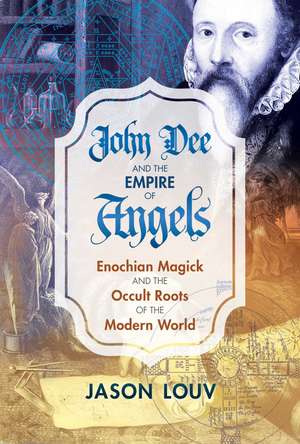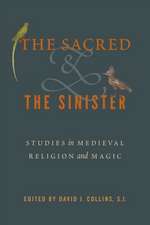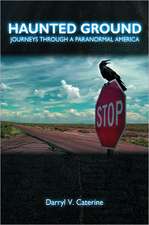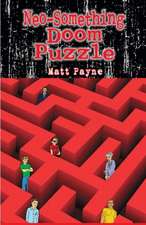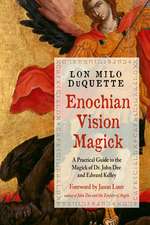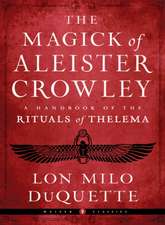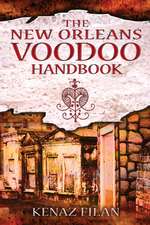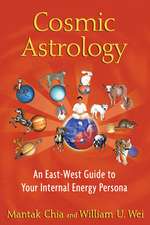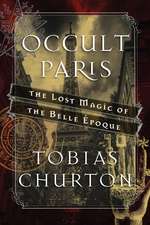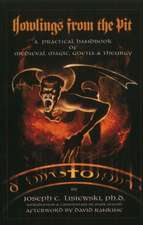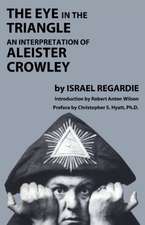John Dee and the Empire of Angels: Enochian Magick and the Occult Roots of the Modern World
Autor Jason Louven Limba Engleză Hardback – 31 mai 2018
A comprehensive look at the life and continuing influence of 16th-century scientific genius and occultist Dr. John Dee
Dr. John Dee (1527-1608), Queen Elizabeth I’s court advisor and astrologer, was the foremost scientific genius of the 16th century. Laying the foundation for modern science, he actively promoted mathematics and astronomy as well as made advances in navigation and optics that helped elevate England to the foremost imperial power in the world. Centuries ahead of his time, his theoretical work included the concept of light speed and prototypes for telescopes and solar panels. Dee, the original “007” (his crown-given moniker), even invented the idea of a “British Empire,” envisioning fledgling America as the new Atlantis, himself as Merlin, and Elizabeth as Arthur.
Presenting a comprehensive overview of Dee’s life and work, Louv examines his scientific achievements, intelligence and spy work, imperial strategizing, and Enochian magick, establishing a psychohistory of John Dee as a singular force and fundamental driver of Western history. Exploring Dee’s influence on Sir Francis Bacon, the development of modern science, 17th-century Rosicrucianism, the 19th-century occult revival, and 20th-century occultists such as Jack Parsons, Aleister Crowley, and Anton LaVey, Louv shows how John Dee continues to impact science and the occult to this day.
Dr. John Dee (1527-1608), Queen Elizabeth I’s court advisor and astrologer, was the foremost scientific genius of the 16th century. Laying the foundation for modern science, he actively promoted mathematics and astronomy as well as made advances in navigation and optics that helped elevate England to the foremost imperial power in the world. Centuries ahead of his time, his theoretical work included the concept of light speed and prototypes for telescopes and solar panels. Dee, the original “007” (his crown-given moniker), even invented the idea of a “British Empire,” envisioning fledgling America as the new Atlantis, himself as Merlin, and Elizabeth as Arthur.
Presenting a comprehensive overview of Dee’s life and work, Louv examines his scientific achievements, intelligence and spy work, imperial strategizing, and Enochian magick, establishing a psychohistory of John Dee as a singular force and fundamental driver of Western history. Exploring Dee’s influence on Sir Francis Bacon, the development of modern science, 17th-century Rosicrucianism, the 19th-century occult revival, and 20th-century occultists such as Jack Parsons, Aleister Crowley, and Anton LaVey, Louv shows how John Dee continues to impact science and the occult to this day.
Preț: 138.26 lei
Preț vechi: 192.35 lei
-28% Nou
Puncte Express: 207
Preț estimativ în valută:
26.46€ • 27.27$ • 22.34£
26.46€ • 27.27$ • 22.34£
Carte disponibilă
Livrare economică 14-26 februarie
Preluare comenzi: 021 569.72.76
Specificații
ISBN-13: 9781620555897
ISBN-10: 1620555891
Pagini: 560
Ilustrații: Includes 16-page color insert and 79 b&w illustrations
Dimensiuni: 152 x 229 x 36 mm
Greutate: 0.86 kg
Editura: Inner Traditions/Bear & Company
Colecția Inner Traditions
ISBN-10: 1620555891
Pagini: 560
Ilustrații: Includes 16-page color insert and 79 b&w illustrations
Dimensiuni: 152 x 229 x 36 mm
Greutate: 0.86 kg
Editura: Inner Traditions/Bear & Company
Colecția Inner Traditions
Notă biografică
Jason Louv is the author of seven books, including Generation Hex, Ultraculture, and Thee Psychick Bible. He runs the high-traffic site Ultraculture.org and teaches courses on magick and spirituality at Magick.me. He has written for many popular websites, including Boing Boing, VICE News, Motherboard, and Esquire Online. He lives in Los Angeles.
Extras
Introduction: A Sublunary World
The Western Mystery Tradition and Esoteric Protestantism
Western esotericism is often seen as a sideline curiosity or footnote to history--at best an early, failed attempt at science. It also tends to be cast in an oppositional role to mainstream religious denominations and movements.
I argue--following Dame Francis Yates--that this is not the case, and that the Western Esoteric Tradition has, for better or worse, been central to the development of European, English, and American spirituality, geopolitics, and empire. Further, it is my contention that the angelic system of John Dee and Edward Kelly has been the central core of the Western Esoteric Tradition in its post-Renaissance form and has been at the heart of Rosicrucianism, Scottish Rite Freemasonry, the Golden Dawn, and Thelema--and, through Thelema, of modern occultural movements like Satanism and witchcraft. These religious subcultures, in the final summation, do not exist in opposition to mainstream Protestantism but are, instead, its esoteric component--in some cases affirming and upholding its theology by acting as its shadow. Therefore, Dee and Kelly’s system has played an invisible but central role in the last five hundred years of Western history.
Though the adepts of this tradition, of which I have taken Dee as an exemplar, have been small in number and marginalized in official history, it is my contention that the experimental world of the occult and its attendant secret societies in many ways represents the “research and development wing” of Western civilization, in which new political, social, and religious models are proposed and tested, often finding wider purchase in society through the efforts of artists and political radicals that fall under the sway of such ideas. The influence of Freemasonry on the American and French revolutions is a primary example.
However, I must distinctly resist any conspiratorial read of this history. The Western Esoteric Tradition has mostly been only sporadically organized, with groups often working in isolation from or even at cross purposes to each other; one would struggle to find core dogmas for the Western tradition, as its ideals and praxis shift significantly between groups and individual practitioners. Even when it does involve large organized groups, like Freemasonry, the history of the Western tradition is still less one of group efforts, let alone large-scale religious revivals, as it is of ideas passing between individual or small collectives of intellectuals, often at a distance of centuries. These thinkers--such as Dee, Newton, Crowley, and many more--have in turn exercised massive influence on the wider culture, often in oblique and non-intuitive ways. A useful and not altogether unconnected parallel can be drawn with Western philosophers like Kant, Nietzsche, and Schopenhauer, who often lived marginal, secluded, and outwardly even feeble lives, yet whose intellectual work caused irreversible and undeniable sea changes in Western civilization, often after their deaths. These changes were not effected by organized conspiracies but by the power of new ideas to rapidly spread between minds and upend entire cultures in the process.
So with that said, what is the Western Esoteric Tradition, other than a catch phrase denoting the occult thinkers and fraternities that have sprouted up throughout European history?
It is my view that this tradition, in its form post-dating Dee, should really be called Esoteric Protestantism, that it is indeed the inner esoteric expression of the Protestant Reformation, and that it has played a guiding role in the spread of Protestantism and its ideals throughout the world.
All religions have an exoteric shell--a system of rules and dogmas for lay people--along with smaller inner esoteric groups focused on mysticism, individual experimentation with spiritual techniques, and, very often, apocalypticism.67 Examples include the tantric schools of Hinduism and Buddhism, the Holy Orders in Catholicism, the Kabbalists in Judaism, the Sufi schools of Islam, and many more. Though Protestantism in its many varieties is only five hundred years old, it is, of course, no different. Esoteric Protestant groups like the Rosicrucians, Freemasonry, the Golden Dawn, and, indeed, the collective of scientists that became the Royal Society are the esoteric core of Protestantism.
As will be discussed, the primary formulation of this tradition can be traced to the sack of Constantinople and the transfer of Byzantine manuscripts containing material from ancient Greece and Rome to the Medici city states. Here, the spiritual ideas of the ancient, pre-Christian world were revived as Renaissance Hermeticism and Neoplatonism, mixing with teachings on the Kabbalah from Europe’s Jews. This amalgam was in turn formulated into a system of “operative magic” by the Benedictine abbot Trithemius and his student Cornelius Agrippa.
These streams of magical thought were prevalent in Europe at the time of Luther’s spiritual revolution and England’s subsequent “Brexit” from Rome, which permanently altered the spiritual politics of the West and which was widely thought to indicate that the Apocalypse was at hand. Against this backdrop of impending Armageddon, these Hermetic, Neoplatonic, cabalistic, and occult ideas and techniques came together in the singular personage of John Dee, who purportedly used them to contact angels. These angels immediately began using Dee, Kelly, and many of their noble and ecclesiastical connections to accelerate Europe even further toward the end times. In order to assist this process, Dee was given the “true” system of magic that earlier Renaissance thinkers had only really made a patchwork approximation of.
While Luther had proposed a break with Rome, and Henry VIII actualized it in England, Dee created the plan for global Protestant victory over the Church--a worldwide Empire of Angels, with Elizabeth I, not the Pope, as its spiritual and political head. Such a global Protestant hegemony would pave the way toward the Second Coming, and central to actualizing this plan was Dee’s angelic system of magic.
The Western Mystery Tradition and Esoteric Protestantism
Western esotericism is often seen as a sideline curiosity or footnote to history--at best an early, failed attempt at science. It also tends to be cast in an oppositional role to mainstream religious denominations and movements.
I argue--following Dame Francis Yates--that this is not the case, and that the Western Esoteric Tradition has, for better or worse, been central to the development of European, English, and American spirituality, geopolitics, and empire. Further, it is my contention that the angelic system of John Dee and Edward Kelly has been the central core of the Western Esoteric Tradition in its post-Renaissance form and has been at the heart of Rosicrucianism, Scottish Rite Freemasonry, the Golden Dawn, and Thelema--and, through Thelema, of modern occultural movements like Satanism and witchcraft. These religious subcultures, in the final summation, do not exist in opposition to mainstream Protestantism but are, instead, its esoteric component--in some cases affirming and upholding its theology by acting as its shadow. Therefore, Dee and Kelly’s system has played an invisible but central role in the last five hundred years of Western history.
Though the adepts of this tradition, of which I have taken Dee as an exemplar, have been small in number and marginalized in official history, it is my contention that the experimental world of the occult and its attendant secret societies in many ways represents the “research and development wing” of Western civilization, in which new political, social, and religious models are proposed and tested, often finding wider purchase in society through the efforts of artists and political radicals that fall under the sway of such ideas. The influence of Freemasonry on the American and French revolutions is a primary example.
However, I must distinctly resist any conspiratorial read of this history. The Western Esoteric Tradition has mostly been only sporadically organized, with groups often working in isolation from or even at cross purposes to each other; one would struggle to find core dogmas for the Western tradition, as its ideals and praxis shift significantly between groups and individual practitioners. Even when it does involve large organized groups, like Freemasonry, the history of the Western tradition is still less one of group efforts, let alone large-scale religious revivals, as it is of ideas passing between individual or small collectives of intellectuals, often at a distance of centuries. These thinkers--such as Dee, Newton, Crowley, and many more--have in turn exercised massive influence on the wider culture, often in oblique and non-intuitive ways. A useful and not altogether unconnected parallel can be drawn with Western philosophers like Kant, Nietzsche, and Schopenhauer, who often lived marginal, secluded, and outwardly even feeble lives, yet whose intellectual work caused irreversible and undeniable sea changes in Western civilization, often after their deaths. These changes were not effected by organized conspiracies but by the power of new ideas to rapidly spread between minds and upend entire cultures in the process.
So with that said, what is the Western Esoteric Tradition, other than a catch phrase denoting the occult thinkers and fraternities that have sprouted up throughout European history?
It is my view that this tradition, in its form post-dating Dee, should really be called Esoteric Protestantism, that it is indeed the inner esoteric expression of the Protestant Reformation, and that it has played a guiding role in the spread of Protestantism and its ideals throughout the world.
All religions have an exoteric shell--a system of rules and dogmas for lay people--along with smaller inner esoteric groups focused on mysticism, individual experimentation with spiritual techniques, and, very often, apocalypticism.67 Examples include the tantric schools of Hinduism and Buddhism, the Holy Orders in Catholicism, the Kabbalists in Judaism, the Sufi schools of Islam, and many more. Though Protestantism in its many varieties is only five hundred years old, it is, of course, no different. Esoteric Protestant groups like the Rosicrucians, Freemasonry, the Golden Dawn, and, indeed, the collective of scientists that became the Royal Society are the esoteric core of Protestantism.
As will be discussed, the primary formulation of this tradition can be traced to the sack of Constantinople and the transfer of Byzantine manuscripts containing material from ancient Greece and Rome to the Medici city states. Here, the spiritual ideas of the ancient, pre-Christian world were revived as Renaissance Hermeticism and Neoplatonism, mixing with teachings on the Kabbalah from Europe’s Jews. This amalgam was in turn formulated into a system of “operative magic” by the Benedictine abbot Trithemius and his student Cornelius Agrippa.
These streams of magical thought were prevalent in Europe at the time of Luther’s spiritual revolution and England’s subsequent “Brexit” from Rome, which permanently altered the spiritual politics of the West and which was widely thought to indicate that the Apocalypse was at hand. Against this backdrop of impending Armageddon, these Hermetic, Neoplatonic, cabalistic, and occult ideas and techniques came together in the singular personage of John Dee, who purportedly used them to contact angels. These angels immediately began using Dee, Kelly, and many of their noble and ecclesiastical connections to accelerate Europe even further toward the end times. In order to assist this process, Dee was given the “true” system of magic that earlier Renaissance thinkers had only really made a patchwork approximation of.
While Luther had proposed a break with Rome, and Henry VIII actualized it in England, Dee created the plan for global Protestant victory over the Church--a worldwide Empire of Angels, with Elizabeth I, not the Pope, as its spiritual and political head. Such a global Protestant hegemony would pave the way toward the Second Coming, and central to actualizing this plan was Dee’s angelic system of magic.
Cuprins
Acknowledgments
In the Garden
Introduction: A Sublunary World
BOOK I
The Magus
1 Elected
2 All as Study of All
3 The Light of the World
4 The Elizabethan Ascension
5 Ladder of Spheres
6 Hammer of the Witches
7 A Cold War for a New World
BOOK II
The Angelic Conversations
8 Contact
9 The Architecture of Apocalypse
10 And Therefore, Behold the End
11 Aethyrs and Watchtowers
12 On a Mission from God
13 I Am the Daughter of Fortitude, and Ravished Every Hour
14 Gold Is the Metal with the Broadest Shoulders
BOOK III
Antichrist
15 The Invisible College
16 Crowned and Conquering
17 In the Shadow of the Cross
18 The Last Jerusalem
Notes
Bibliography
Index
In the Garden
Introduction: A Sublunary World
BOOK I
The Magus
1 Elected
2 All as Study of All
3 The Light of the World
4 The Elizabethan Ascension
5 Ladder of Spheres
6 Hammer of the Witches
7 A Cold War for a New World
BOOK II
The Angelic Conversations
8 Contact
9 The Architecture of Apocalypse
10 And Therefore, Behold the End
11 Aethyrs and Watchtowers
12 On a Mission from God
13 I Am the Daughter of Fortitude, and Ravished Every Hour
14 Gold Is the Metal with the Broadest Shoulders
BOOK III
Antichrist
15 The Invisible College
16 Crowned and Conquering
17 In the Shadow of the Cross
18 The Last Jerusalem
Notes
Bibliography
Index
Recenzii
"Written in breezy, informal prose, Louv’s overstuffed book will appeal to those interested in angels or the occult."
“John Dee is the original Elizabethan mage-scientist, who invented the British Empire and invested it with magical power. He is to Elizabeth what Merlin was to Arthur, except he was real. Here’s the original technology of weaponized memes, psyops, and empire building in a gripping, authoritative account of how and why we became an occult society.”
“Any biographical treatment of John Dee must be nothing less than epic--and Jason Louv has gloriously achieved this in John Dee and the Empire of Angels, a truly comprehensive, broad-spectrum, and lavishly beautiful historical study of the master magus and the counter-current of secret history Dee launched into the world, which has affected us all.”
“A crazy plunge into the weird world of angels and those brave or foolish enough to try to contact them. Be prepared, for this book illuminates the dark corners of history that many institutions would prefer to go unexplored and unmentioned--I’m thankful for the angels that aided Jason in his creation of this mind-spinning, glorious work of occult genius.”
“Renaissance magus John Dee boldly set out to systematically tap the mind of God by communicating directly with a complex hierarchy of ‘angelic’ intelligences. It can be argued that he succeeded. His magical diaries have long held intense fascination among Qabalists, alchemists, and explorers of human consciousness who have developed workable magical systems from these records. Jason Louv’s work succeeds, with breathtaking thoroughness, to tell this amazing and true magical tale. More importantly, he also reveals the profound geopolitical significance of Dee’s magical explorations--effects that still shape the global realities of today.”
“Jason Louv’s John Dee and the Empire of Angels is a groundbreaking new assessment of one of the Western world’s most influential polymaths. Through a combination of intellectual rigor, sensitivity to both historical and current sociopolitical climates, and perhaps a bit of his own intuitive scrying, Louv offers us a crystalline view of John Dee’s visionary mind and complicated legacy.”
“Jason Louv’s masterful account of the enigmatic Elizabethan magus John Dee places him in the top tier of new esoteric writers. . . . Louv’s assertion of Dee as both a creator and custodian of Western civilization is thought-provoking, and it is backed up by meticulous research. Highly recommended.”
“The Dee story is among the most mystifying and important in the entire history of the Western esoteric tradition. And here, Jason Louv has given us the most complete, complex, and balanced account yet of Dee and his aftermath. An awesome achievement.”
“Jason Louv’s book is absolutely invaluable. It contextualizes the very bedrock that Western ceremonial magic is based on. Dee and Kelly’s legendary experiments are the cornerstone of our Western understanding of how magic works. But there’s more to it than that. Louv’s impressive work is not only an enjoyable, adventurous journey into esoteric history but also one into the multifaceted--and sometimes dangerous--machinations of the human mind.”
“Jason Louv weaves a masterfully poetic web that first introduces you and then sucks you into Dee’s luminous world of magick. This book is not just a book about the occult and magick; it’s also a unique historical reference guide that I found to be a hypnotic read. Jason is a brilliant mind and writer, and this book proves that.”
“Never has there been a more valuable and more prescient time than NOW to have John Dee and the Empire of Angels published.”
“This is the first book I’ve seen where Dee’s angelic magic is neither discussed in isolation, nor dismissed as an eccentric sideline, but recognized as a key part of Dee’s philosophy and political influence right up to the present day.”
“Our current magical revival is largely defined by the restoration of context. It is pleasing to see Dee and Kelley put back into the historical currents that they both defined and were defined by, where they can come alive once again after more than a century’s relegation to the cabinets of Victorian orders. The Queen’s conjuror returns to Mortlake.”
“John Dee is the original Elizabethan mage-scientist, who invented the British Empire and invested it with magical power. He is to Elizabeth what Merlin was to Arthur, except he was real. Here’s the original technology of weaponized memes, psyops, and empire building in a gripping, authoritative account of how and why we became an occult society.”
“Any biographical treatment of John Dee must be nothing less than epic--and Jason Louv has gloriously achieved this in John Dee and the Empire of Angels, a truly comprehensive, broad-spectrum, and lavishly beautiful historical study of the master magus and the counter-current of secret history Dee launched into the world, which has affected us all.”
“A crazy plunge into the weird world of angels and those brave or foolish enough to try to contact them. Be prepared, for this book illuminates the dark corners of history that many institutions would prefer to go unexplored and unmentioned--I’m thankful for the angels that aided Jason in his creation of this mind-spinning, glorious work of occult genius.”
“Renaissance magus John Dee boldly set out to systematically tap the mind of God by communicating directly with a complex hierarchy of ‘angelic’ intelligences. It can be argued that he succeeded. His magical diaries have long held intense fascination among Qabalists, alchemists, and explorers of human consciousness who have developed workable magical systems from these records. Jason Louv’s work succeeds, with breathtaking thoroughness, to tell this amazing and true magical tale. More importantly, he also reveals the profound geopolitical significance of Dee’s magical explorations--effects that still shape the global realities of today.”
“Jason Louv’s John Dee and the Empire of Angels is a groundbreaking new assessment of one of the Western world’s most influential polymaths. Through a combination of intellectual rigor, sensitivity to both historical and current sociopolitical climates, and perhaps a bit of his own intuitive scrying, Louv offers us a crystalline view of John Dee’s visionary mind and complicated legacy.”
“Jason Louv’s masterful account of the enigmatic Elizabethan magus John Dee places him in the top tier of new esoteric writers. . . . Louv’s assertion of Dee as both a creator and custodian of Western civilization is thought-provoking, and it is backed up by meticulous research. Highly recommended.”
“The Dee story is among the most mystifying and important in the entire history of the Western esoteric tradition. And here, Jason Louv has given us the most complete, complex, and balanced account yet of Dee and his aftermath. An awesome achievement.”
“Jason Louv’s book is absolutely invaluable. It contextualizes the very bedrock that Western ceremonial magic is based on. Dee and Kelly’s legendary experiments are the cornerstone of our Western understanding of how magic works. But there’s more to it than that. Louv’s impressive work is not only an enjoyable, adventurous journey into esoteric history but also one into the multifaceted--and sometimes dangerous--machinations of the human mind.”
“Jason Louv weaves a masterfully poetic web that first introduces you and then sucks you into Dee’s luminous world of magick. This book is not just a book about the occult and magick; it’s also a unique historical reference guide that I found to be a hypnotic read. Jason is a brilliant mind and writer, and this book proves that.”
“Never has there been a more valuable and more prescient time than NOW to have John Dee and the Empire of Angels published.”
“This is the first book I’ve seen where Dee’s angelic magic is neither discussed in isolation, nor dismissed as an eccentric sideline, but recognized as a key part of Dee’s philosophy and political influence right up to the present day.”
“Our current magical revival is largely defined by the restoration of context. It is pleasing to see Dee and Kelley put back into the historical currents that they both defined and were defined by, where they can come alive once again after more than a century’s relegation to the cabinets of Victorian orders. The Queen’s conjuror returns to Mortlake.”
Descriere
A comprehensive look at the life and continuing influence of 16th-century scientific genius and occultist Dr. John Dee
